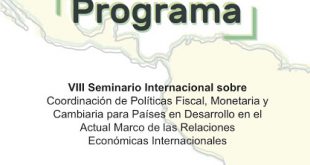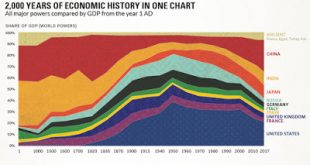New paper by Fabio Petri published in Œconomia. From the abstract: With the shift from traditional analyses where capital is a single value factor of variable ‘form’ to the neo-Walrasian versions, general equilibrium theory has encountered new problems pointed out by P. Garegnani (1976, 1990): impermanence problem, price-change problem, substitutability problem radically question the right to consider neo-Walrasian equilibria as approximating the actual path of real economies. The...
Read More »On the jobs report at the Rick Smith Show
[embedded content]A bit old now. On the dismal report from the the first week of October, and Trumponomics in general.
Read More »Anwar Shaikh at Bucknell
[embedded content] Anwar will give a lecture at Bucknell next week (Thursday, October 12 at 4pm, in Academic West 112). Open to the public, and if you are in central PA you should NOT miss it up. Above a talk he gave last year at SOAS based on his recent book of the same title available here.
Read More »Masters & Sindicalists: Growth, Investment and Productivity in Argentina, from Perón to Kirchner
New paper published in Ensaios FEE. In all fairness, this was the paper that should have been published in 2013 in the volume organized by Ricardo Bielschowky and available here. But the revisions took longer than expected. It is in Portuguese, however. Below the English abstract. This paper analyzes the three phases of Argentine economic development since the end of the 19th century, namely: the commodity export model, the period of state-led industrialization and the neoliberal reforms...
Read More »Marx Capital turns 150
Marx's capital (Volume 1) was published September 14, 1867, exactly 150 years ago. Below a few links to posts on Marx written over the years.What makes capitalism capitalism? (on the definitions of capitalism as a mode of production) Sraffa and Marxism or the Labor Theory of Value, what is it good for? (on the labor theory of value) Was Marx right? Nice of you to ask, but... (on common misconceptions about Marx)A Note on the Concept of Vulgar Economics (an important idea, often...
Read More »Seminar in Mexico
The 8th international seminar on Coordination of Fiscal, Monetary and Exchange Rate Policies in Developing Countries at the Universidad Nacional Autónoma de México, Facultad de Estudios Superiores Acatlán (UNAM-FES-Acatlán) will take place later this month. Ignácio Perrotini and I will give the opening talks the 26, and Ariel Dvoskin the following day. Many local economists will present too, like Flor Brown, Lilia Domínguez, Noemí Levy, Teresa López, and Luis Ángel Ortiz to name a few....
Read More »ReOrient
A graph that shows, for a longer span, essentially the same information presented in Robert Allen's graph of manufacturing production, and discussed before here. It is evident that the rise of China (India is not quite yet visible, even if its share did increase) represents a certain rebalancing, which is inevitable as the income per capita grows in that country, even if it does not scape what mainstream economists refer to as the middle income trap. Source here, and the data is, as...
Read More »Sunday Reading: Economic Letters of Note
Rick Holt edited a superb book with John Kenneth Galbraith's letters from the 1930s until his death in 2006. He wrote to everybody, friend and foe, and displays his usual wit. Here I reproduce parts of his letter to Joan Robinson, that he wrote after having invited her to give the Ely Lecture (subscription required).The letter is from January 12, 1972. It says:Dear Joan: Many thanks for your note. If the meetings were slightly less stuffy and neoclassical than usual, it was owing more...
Read More »Don’t be evil… oh well, perhaps a little bit
Don't be evil was, of course, Google's motto. The New York Times had a piece recently on the firing of Barry Lynn from the New America Foundation, a Democratic think tank that, if memory doesn't fail me, was at least initially connected to the Clintons. The whole thing resulted from the fact that Lynn was favorable to the European Union regulation of Google, a major donor to the think tank.Given that I've been writing about the influence of corporate money in academia, I thought it was a...
Read More »‘Edupreneurs,’ Corporate Universities and Pluralism in Economics
I posted recently on the increasing influence of corporate money in academia, specifically the new Marriner Eccles center funded by the Koch brothers at the University of Utah. The piece by David V. Johnson in the Baffler on this subject is worth reading. As he notes, the new breed of private money goes beyond what they used to do in the past, trying to directly influence what kind of research, the curriculum and what ideas should be disseminated, and, indirectly who should be hired and...
Read More » Naked Keynesianism
Naked Keynesianism






